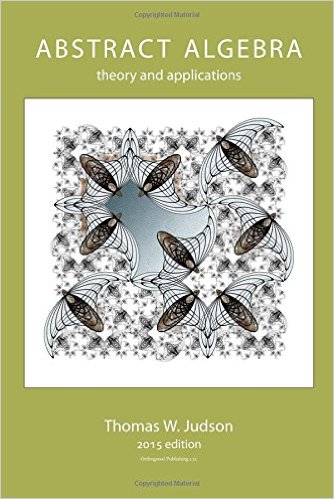
Abstract Algebra: Theory and Applications
An open-source textbook that is designed to teach the principles and theory of abstract algebra to college juniors and seniors in a rigorous manner.
Tag(s): Linear Algebra
Publication date: 17 Aug 2015
ISBN-10: 0989897591
ISBN-13: 978-098989759
Paperback: 432 pages
Views: 13,939
Type: N/A
Publisher: Orthogonal Publishing L3C
License: GNU Free Documentation License
Post time: 03 May 2016 12:00:00
Abstract Algebra: Theory and Applications
 An open-source textbook that is designed to teach the principles and theory of abstract algebra to college juniors and seniors in a rigorous manner.
An open-source textbook that is designed to teach the principles and theory of abstract algebra to college juniors and seniors in a rigorous manner.
Publication date: 17 Aug 2015
ISBN-10: 0989897591
ISBN-13: 978-098989759
Paperback: 432 pages
Views: 13,939
Document Type: N/A
Publisher: Orthogonal Publishing L3C
License: GNU Free Documentation License
Post time: 03 May 2016 12:00:00
Click here to read the full license.
Abstract Algebra: Theory and Applications is an open-source textbook that is designed to teach the principles and theory of abstract algebra to college juniors and seniors in a rigorous manner. Its strengths include a wide range of exercises, both computational and theoretical, plus many non-trivial applications. The first half of the book presents group theory, through the Sylow theorems, with enough material for a semester-long course. The second-half is suitable for a second semester and presents rings, integral domains, Boolean algebras, vector spaces, and fields, concluding with Galois Theory.
Tweet
About The Author(s)
Robert A. Beezer is a Professor of Mathematics at the University of Puget Sound, where he has been on the faculty since 1984. In addition to his teaching at the University of Puget Sound, he has made sabbatical visits to the University of the West Indies (Trinidad campus) and the University of Western Australia. He has also given several courses in the Master’s program at the African Institute for Mathematical Sciences, South Africa. He has been a Sage developer since 2008. He teaches calculus, linear algebra and abstract algebra regularly, while his research interests include the applications of linear algebra to graph theory.

Robert A. Beezer is a Professor of Mathematics at the University of Puget Sound, where he has been on the faculty since 1984. In addition to his teaching at the University of Puget Sound, he has made sabbatical visits to the University of the West Indies (Trinidad campus) and the University of Western Australia. He has also given several courses in the Master’s program at the African Institute for Mathematical Sciences, South Africa. He has been a Sage developer since 2008. He teaches calculus, linear algebra and abstract algebra regularly, while his research interests include the applications of linear algebra to graph theory.
Thomas W. Judson is Associate Professor of Mathematics and Statistics at Stephen F. Austin State University. His research interests include mathematics education, differential geometry, Lie algebras and Lie pseudogroups.

Thomas W. Judson is Associate Professor of Mathematics and Statistics at Stephen F. Austin State University. His research interests include mathematics education, differential geometry, Lie algebras and Lie pseudogroups.